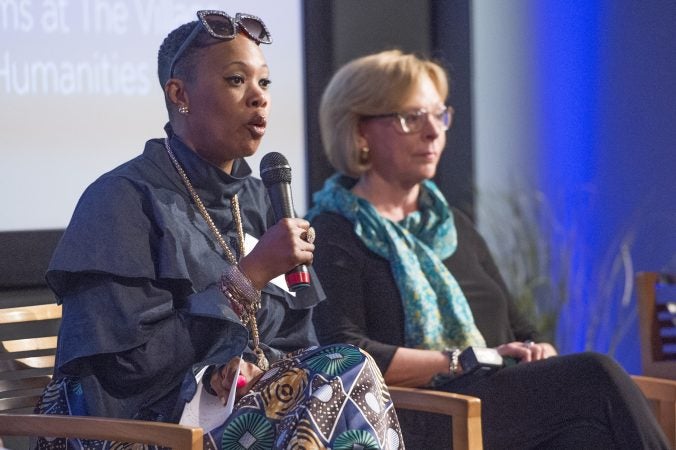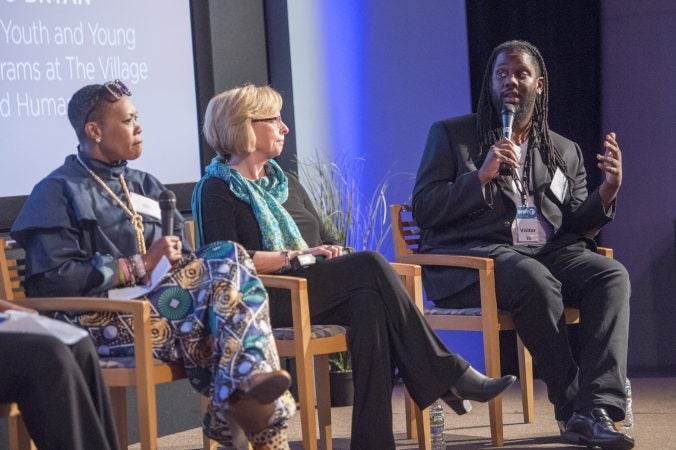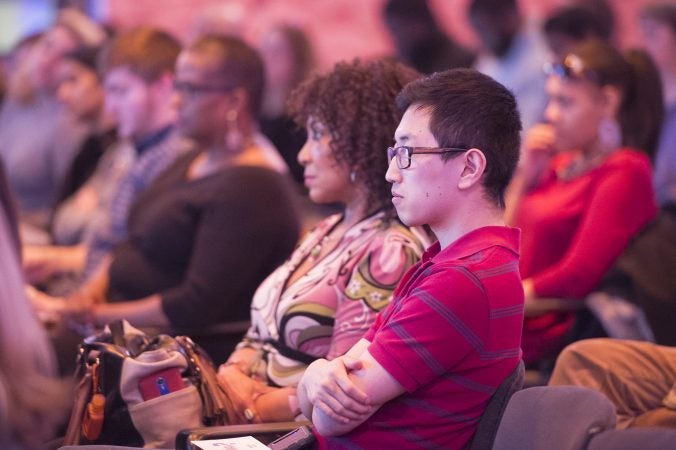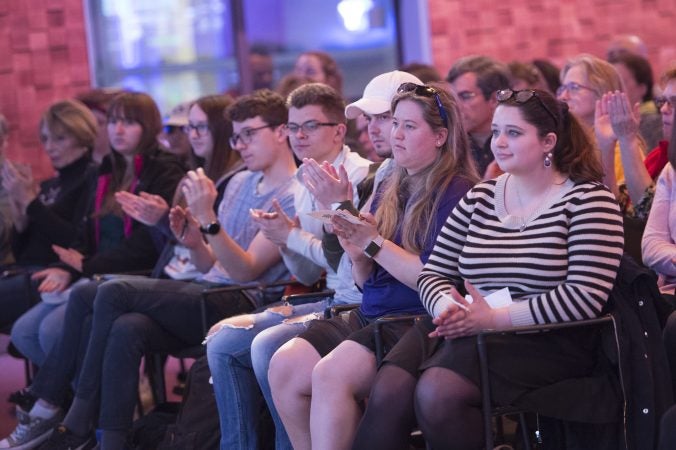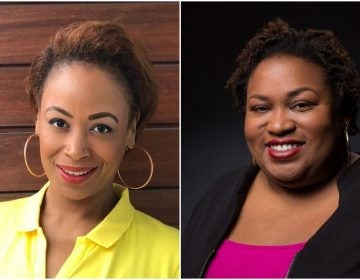‘Moment to Movement’ event discusses longterm impact of #MeToo
As more women have been empowered to speak up in response to workplace harassment in recent months, many are wondering how this moment will translate into a culture change.
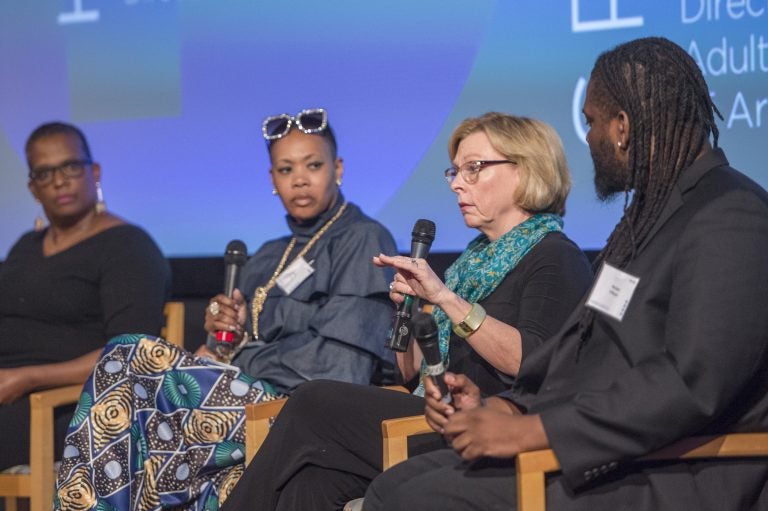
Marci Hamilton addresses questions from audience members during a panel discussion on workplace harassment and the #MeToo movement. From left are Annette John-Hall, Lynette Medley, Marci Hamilton and Michael O'Bryan. (Jonathan Wilson/for WHYY)
As more women have been empowered to speak up in response to workplace harassment in recent months, many are wondering how this moment will translate into a culture change. While individual men in positions of power have been held accountable for their actions, how do we teach people to behave differently in the first place?
That was the subject at hand Wednesday night here at WHYY, where panelists gathered to discuss how #MeToo can shift from a moment, to a movement.
Those participating acknowledged progress, but say it’s moving far too slowly.
WHYY’s Marty Moss-Coane of Radio Times and Maiken Scott of The Pulse hosted a panel where educators, researchers, human resource specialists, and journalists discussed how the momentum of the movement can be translated into lasting change.
The evening began with a series of short videos, produced by actor David Schwimmer, which feature professional actors playing out a series of very uncomfortable and realistic scenarios of workplace harassment. Scott asked HR specialist Alison Diflorio to offer her professional advice to the women in each scenario. Diflorio’s answers felt like instructions you might get in a self-defense class: Always be prepared. Get to know your employee handbook so you know what you’re entitled to. Always file a complaint, even if it seems scary. Remember you have legal recourse even if you’re afraid there might be consequences. And maybe most importantly, trust your instincts.
“If you think it feels weird, it’s weird,” Diflorio told the audience.
But as the conversation deepened, many of the panelists acknowledged that while Diflorio’s advice is the ideal course of action, even in this current political moment, there is still a lot at stake for women when they consider whether to speak out. WHYY journalist Annette John-Hall described her experience working as a sports reporter in the 1980s. She said she recognized she was given an amazing opportunity by her boss, but he still made her uncomfortable by asking to take photos of her, and inviting her on vacation with him. Moss-Coane asked panelist Lynette Medley, a sex-educator and founder of No More Secrets, what advice she would have given to a young John-Hall.
“I would have told her at the time, maybe don’t be around him, but I don’t know if I would’ve said file the claim, because I didn’t know if she was going to get another job,” Medley admitted.
“Especially as a black woman talking to another black woman, those are real dynamics in power — especially when you’re trying to get into a space or a place that isn’t normally occupied by us.”
Panelist Marci Hamilton teaches at the University of Pennsylvania where she researches child abuse and neglect. For her, the key is changing the legal system —specifically, by lengthening the amount of time to bring legal action against abusers. For example, she pointed out that, especially in abuse cases involving children, trauma makes it hard for victims to come forward right away.
“It’s the statute of limitation that really shuts everybody down,” Hamilton told the audience. “It shuts the kids down, it shuts the women down, and it keeps the men in power.”
Hamilton acknowledged progress has been made. She recalled, during her time as an undergraduate at Vanderbilt, when fraternity brothers would line up outside of her dormitory every morning to rank the women 1-10 as they filed out for breakfast.
“It never occurred to anybody to turn it back on them,” she joked. “Hey buddy — you’re a one.” Today, said Hamilton, this type of behavior would not be tolerated at the school.
But the educators on the panel stressed that the change needs to happen sooner than college, and they are worried it isn’t, at least not yet. Medley has conversations about sex education with students in local schools and says most of the students she talks to haven’t heard of the #MeToo movement.
Panelist Michael O’Bryan is Director of Youth and Young Adult Programs at The Village of Arts and Humanities. He says most of the young men he works with are not talking about issues of harassment or consent. For his part, O’Bryan said he doesn’t think women should have to bear all the burden in changing the culture around harassment. That is a role he believes he and other men must play.
“That’s the credible messenger of that community’s job,” O’Bryan said. He acknowledged that this is a difficult task, and some of the language and buzz words surrounding the movement like “toxic masculinity” might keep young men from wanting to engage.
“I know that if I’m going to talk to young 18-, 19-, 20-year-olds, if I start the conversation calling them toxic, I don’t know if that’s the point of initiation,” he explained. “I can get there, but it’s about building that relationship first.”
WHYY is your source for fact-based, in-depth journalism and information. As a nonprofit organization, we rely on financial support from readers like you. Please give today.


